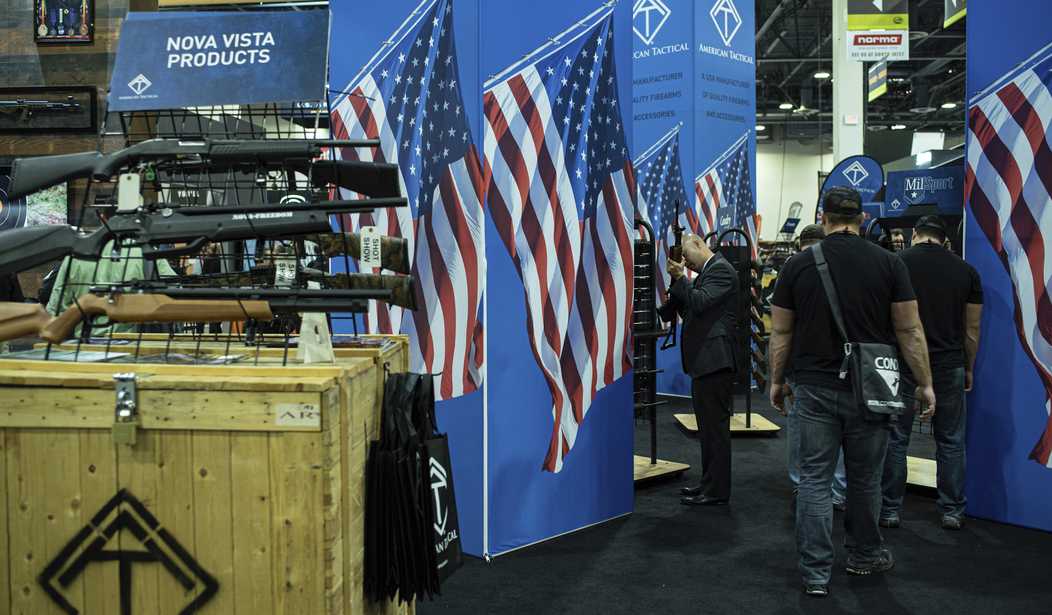The sick and twisted soul who murdered three people in cold blood at a Dollar General in Jacksonville, Florida last week appears to have been motivated by a hatred of black Americans, but according to Gifford’s Allison Anderman, the real villain in that terrible incident is the firearms industry, which she claims is “in the business of hate”; a laughable assertion given the rise in gun ownership among groups who are most likely to be the victim of a hate crime.
At Newsweek, Anderman does her level best to demonize the firearms industry, though her “evidence” that gun makers are fueled by hatred or animosity towards any group is non-existent.
Palmetto State Armory, a North Carolina-based gun store, designed a line of “Big Igloo Aloha” AK-47 assault rifles marketed to the Boogaloo Bois, an anti-government extremist movement that advocates for a second civil war. Companies like Daniel Defense marketed AR-15s with slogans encouraging young men to “use what the special forces guys use.”
The M&P15—which stands for military and police—became one of the best-selling rifles in America. The M&P15 was the gun used by Kyle Rittenhouse, the vigilante teenager who fatally shot two Black Lives Matter protesters in Kenosha, Wisconsin, in 2020, as well as mass shooters in Parkland, Florida, and Highland Park, Illinois.
That’s the entire weight of Anderman’s argument, and every one of the examples she gives is completely void of any evidence that manufacturers are intentionally marketing or designing products for bigots and racists.
To make matters worse, Anderman plays fast and loose with statistics from the Bureau of Justice Statistics’ National Crime Victimization Survey, claiming that “[e]very year, the United States experiences more than 10,300 violent hate crime attacks involving the use or threatened use of guns.” Note that Anderman had to include the “threatened use of guns”, because according to the NCVS, the vast majority of violent hate crimes did not involve a firearm at all.

According to the National Crime Victimization Survey, about 1-in-4 hate crimes involved a weapon of any kind, but less than 5% involved a firearm. In fact, according to the Bureau of Justice Statistics, “a lower percentage of violent victimizations involved a firearm in hate (5%) than nonhate (7%) crime victimization.”
Contrary to Anderman’s insinuations, firearms are rarely used in hate crimes, and other weapons are nearly five times more likely to be present than a gun when someone is victimized. I realize that for Anderman and other anti-gun activists, every tragedy or horrific crime involving the use of a gun is an opportunity to exploit the pain and grief of those left behind, but it’s shameful to see her engage in precisely the same type of bigotry and scapegoating “others” (in this case, firearm manufacturers) that she’s supposedly interested in fighting against.
I’ve long said that self-defense is a human right; applicable and available to all who make up “we the people”. You don’t have to look like me, think like me, vote like me, or hold my same values and beliefs to share in our Second Amendment right to keep and bear arms, and across the country we’re seeing an increasingly diverse number of Americans exercising that right; something I suspect is also behind Anderman’s zealous effort to paint the gun industry as a bunch of bigots. Stories like this must leave Anderman with heartburn, knowing that the gun control lobby’s lies are failing to persuade those new gun owners to leave their rights behind.
… across the country, Black women — who for years have seen their communities disproportionately affected by gun violence — see the issue also in terms of underlying disinvestment and poverty. And they’ve invested in their own protection by buying guns themselves.
According to statistics from The Firearm Industry Trade Association, retailers saw an increase of 87% among African American women who bought guns in the first half of 2021.
Aleisha Olatunde, 35, a licensed professional counselor with her own private practice, hadn’t owned a gun before she joined the Posse. But she has relatives who’ve been fatally shot. (So have the others.)
She says high unemployment during Covid-19 and racial unrest following the murder of George Floyd made Black communities particularly vulnerable and scared.
“So everybody was like, ‘Oh no, if I’m gonna fight, I’m gonna fight with a gun,’” she says, “because they want to protect what’s theirs, whether that be family or home.”
Everyone has a right to protect themselves and the people they love, be it a violent home invasion, carjacking or an assault based on the color of their skin, their sexuality, or their religious faith. As my friend and colleague Ranjit Singh says, while the anti-gun bigots like Anderman insist that the answer is to #DisarmHate (and everyone else) more and more of us are choosing to #ArmLove instead, and I’ve never met anyone in the firearms industry who thinks that’s a problem.









Join the conversation as a VIP Member